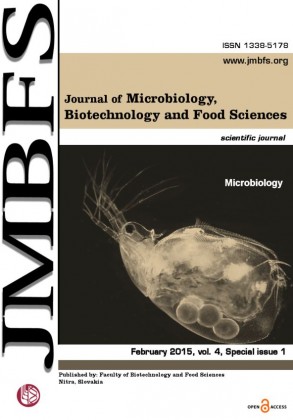ANTIBIOTIC RESISTANCE IN ENTEROBACTERIACEAE STRAINS ISOLATED FROM CHICKEN AND MILK SAMPLES
DOI:
https://doi.org/10.15414/jmbfs.2015.4.special1.19-22Keywords:
Antibiotic resistance, Enterobacteriaceae, chicken, milkAbstract
Antibiotic resistance and identification of strains in Enterobacteriaceae genera isolated from milk, milk products and rectal swabs of chicken was examined in this experiment. After samples collection cultivation and identification of bacterial strain was done. MALDI TOF MS Biotyper for identification of Enterobacteriaceae strains was used. For susceptibility testing disc diffusion methodology was used according by EUCAST. Results showed high level of ampicillin resistance in isolates from milk and milk samples. The highest streptomycin resistance was detected in isolates from rectal swabs of chicken. After identification, we determined that S. enterica ser. Typhimurium, which was isolated from rectal swabs of chicken showed the most multi-resistance from all identificated strains of Enterobacteriaceae. The most isolates bacterial strain was E. coli, which showed resistance against four antibiotics from rectal swabs of chicken. Also our results showed that the higher resistance level is in rectal swabs of chicken like in milk samples.Downloads
Download data is not yet available.
Downloads
Published
2015-02-02
How to Cite
Hleba, L., Petrová, J., Kántor, A., ÄŒuboň, J., & KaÄániová, M. (2015). ANTIBIOTIC RESISTANCE IN ENTEROBACTERIACEAE STRAINS ISOLATED FROM CHICKEN AND MILK SAMPLES. Journal of Microbiology, Biotechnology and Food Sciences, 4(special issue 1 (Microbiology), 19–22. https://doi.org/10.15414/jmbfs.2015.4.special1.19-22
Issue
Section
Microbiology
License
Copyright (c) 2015 Lukáš Hleba, Jana Petrová, Attila Kántor, Juraj ÄŒuboň, Miroslava KaÄániová

This work is licensed under a Creative Commons Attribution 4.0 International License.
All papers published in the Journal of Microbiology, Biotechnology and Food Sciences are published under a CC-BY licence (CC-BY 4.0). Published materials can be shared (copy and redistribute the material in any medium or format) and adapted (remix, transform, and build upon the material for any purpose, even commercially) with specifying the author(s).





